Recipients of the ‘Joan Eakin Award for Methodological Excellence in a Qualitative Doctoral Dissertation’.
2024 - 2025
The winner of the 2024-25 Joan Eakin Award for Methodological Excellence in a Qualitative Doctoral Dissertation is Dr. Kim Collins, for her dissertation titled, Feeling Climate Change: Experiences of Ecological Emotions on Urban Farms.

The Award Committee had the following to say about Dr. Collins’ work:
Dr. Collins’ dissertation was compelling, innovative and deeply insightful in its analysis. The theoretical chapters, which were extraordinarily thoughtful and well laid out, blended effortlessly into the methodological description. In particular the notion of relationality and “human-more-than human interconnection” for Critical Public Health was very interesting. Chapter 4 was outstanding, moving beyond the rigid scientific descriptions of “methodological recipes” to incorporate reflexive jolting, pictures, and descriptions of relationships with community partners. Some of the descriptions were almost phenomenological in nature. The use of composting as an analogy for data analysis was fascinating. We were also intrigued by the use of volunteering labor on the urban farm as a form of “compensation” and the use of soundscapes as data. The author called attention to the centrality of relationships, interconnections, etc. in the theoretical chapters and embodied these concepts in the conduct of the research. This felt highly innovative and relational, challenging the conventions of a traditional doctoral project.
The honourable mention of this year’s award goes to Dr. Bernice Yanful for her thesis, Cultivating Food Sovereignty Through School Food? A Critical Discourse Analysis of Ghana’s School Feeding Programme.

The Award Committee made the following comments about her submission:
Dr. Yanful’s work offered a sophisticated rendering of complex theory that was congruent throughout all stages of her research in a particularly seamless way. The committee appreciated the author’s use of reflexivity, describing their own family experiences of migration and exposing tensions in their positionality that remained unresolved rather than glossed over as many authors do. The theoretical description of Gramsci’s hegemony and postcolonial perspectives were very well done and moved well into the methodological chapter. We wanted to know more about poetic transcription in the work and were disappointed it was not included in the submission.
2023 - 2024

The recipient of the 2023-24 Dissertation Award is Dr. Karima Joy for her thesis titled, “Honouring Grief Experiences in Life, Death, and the Workplace: A Critical Analysis of Bereavement Accommodation for Workers in Precarious Employment in Canada”.
The Award Committee had the following to say about Dr. Joy’s work:
Dr. Joy’s dissertation draws on critical qualitative research and feminist ethics and employs policy analysis and in-depth interviews to explore the everyday experiences of bereaved workers in precarious employment. Through her work, she argues “that bereavement is a neglected public health issue driven by socio-political forces that devalue relationality, stigmatize emotions, and render bereavement an individual responsibility.” The Committee was unanimously struck by the eloquence of Dr. Joy’s writing, the compelling and thoughtful nature of her argument, and her extraordinary weaving of reflexivity throughout her work through the lens of feminist ethics. Dr. Joy applied feminist ethics not only to her study, but to herself and the research process, thus offering an extraordinary theoretical and methodological congruence and a deep embodiment and enactment of reflexivity which is rarely seen.
2022 - 2023
The co-recipients of the 2022-23 Dissertation Award are Dr. Astrid Escrig-Pinol for her thesis titled, “Salud, Dinero y Amor: Mexican Women and their Extended Families Confronting Precarity in a Canadian Agricultural Labour Migration Program” and Dr. Janna MacLachlan, for her dissertation “Naalagiursaniq Tunnganarnirlu (Learning to Listen and be Welcoming): Engaging Inuit Perspectives on Timimut Ikajuqsivik (Rehabilitation Services) for Children in the Qikiqtani Region of Nunavut”.

The Award Committee had the following to say about Dr. Escrig-Pinol’s work:
Escrig-Pinol’s dissertation investigates the experiences of Mexican women in the Seasonal Agricultural Worker Program (SAWP) and their extended families. The dissertation committee found the work to be a sophisticated and deeply engaging rendering of complex and inter-related theories/concepts including post-colonialism, post-colonial feminist thought, de-colonial theory and cognitive injustice. The multi- country ethnographic approach comprises an exciting methodological innovation called the emojional calendar, which functions as a graphic participatory method and a culturally appropriate entry point to discuss health and well-being. Escrig-Pinol’s writing is eloquent, elegant, and compelling – all evidence of mature scholarship. Importantly, they integrate reflexivity as a key analytical stance. The dissertation functions to increase public knowledge about the social, economic, and political conditions shaping the health and well-being of migrants and their families. In addition, the research advances our understanding of health equity by critically analyzing gaps and opportunities in policy and programs to improve the health and well-being of transnational migrant families.
The Award Committee made the following comments about Dr. MacLachlan’s submission:

MacLachlan’s dissertation advances knowledge on how the timimut ikajuqsivik (rehabilitation) interests of Inuit children in the Qikiqtani Region of Nunavut can be understood and supported. As a means of redressing inequitable power dynamics that privilege Eurocentric health perspectives over those of Inuit, the thesis deploys critical decolonializing theory to interrogate dominate power relations and open up opportunities for social justice. The dissertation committee was impressed by the consistent and productive use of reflexivity, whereby readers are made aware of MacLachlan’s White settler academic status and intention to practice critical allyship. The methodology’s origins in community engagement and commitment to Inuit epistemologies are meritorious. This approach is complimented by critical theory which helps to expose colonialism and support change. An innovative and exciting component of the dissertation is the development of an accountability framework to support bridging Inuit worldviews and the critical paradigm. MacLachlan advances important insights about the difficult work of bridging and balancing paradigms, which is inevitably a social process. The framework builds on recent recommendations for investment in paradigm bridging projects that foreground Indigenous worldviews in research.
2020 - 2021
The winner of the 2020-2021 Joan Eakin Award for Methodological Excellence in a Qualitative Doctoral Dissertation is Dr. Katie Mah, for her dissertation titled, “Freaked out” by Pediatric Concussion: An Exploration of Drawing and Interview Data Produced by Children ‘at risk’ of and Living with Concussion.
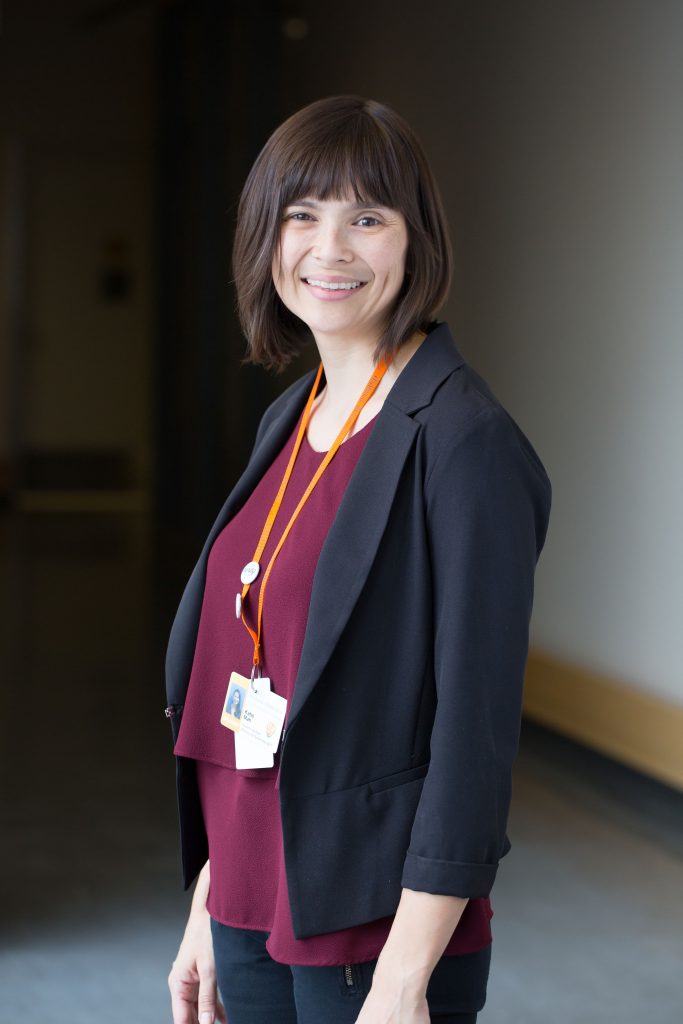
The Award Committee had the following to say about Dr. Mah’s work:
Dr. Mah’s dissertation is an outstanding submission. The research provides a critical examination of how children experience concussion using the post-structural theory of Michel Foucault and a critical qualitative arts-based approach, including participant drawing and semi-structured interviews. The argument for using a critical qualitative approach is compelling and highly productive in identifying how children achieve social competencies in relation to concussion. Dr. Mah’s reflexivity is a powerful example of the creative presence of the researcher. A clear and well written dissertation took us on a transformative journey; the account helped us to move beyond biomedical concepts towards an understanding of how discourses inhibit the way children experiencing concussion can think, speak, and act. The dissertation is sophisticated, timely and highly relevant.
The honourable mention of this year’s award goes to Dr. Tieghan Killackey for her thesis Advance Care Planning in Advanced Heart Failure: A Relational Exploration of Autonomy.

The Award Committee made the following comments about her submission:
Dr. Killackey’s dissertation is a highly original exploration of advanced care planning (ACP) among patients experiencing heart failure using a framework of feminist ethical theory and relational autonomy. The study illuminates unexamined power relations that act as oppressive forces inhibiting an individual’s ability to exert decisional autonomy. The dissertation is a refreshing application of theory in cardiovascular research and points to opportunities to enhance individual agency in the face of existing constraint.
2019 - 2020
The winner of the 2019-2020 Joan Eakin Award for Methodological Excellence in a Qualitative Doctoral Dissertation is Dr. Sarah Elton, for her dissertation titled A posthumanist study of health and the food system: Vegetal politics in Toronto Urban Gardens in the Anthropocene.
The Awards Committee had the following to say about Dr. Elton’s work: “This is a really outstanding submission that abounds with creativity and innovation. Employing posthumanist theory, this multispecies ethnography examines how plants support human health in the city. In doing so, it challenges our notions of who and what are social actors. The notion of ‘vegetal politics’, plants as participants and the co-constructed nature of Dr. Elton’s research are highly intriguing and forward-thinking. Through a masterful flow and logic of argumentation, and a high level of reflexivity, Dr. Elton pushes the boundaries of qualitative research and yet is always rigorous and theoretically grounded. The language she uses demonstrates a creative playfulness that is refreshing in scholarly work and indeed, all too rare.”
You can view Dr. Elton’s dissertation on the University of Toronto’s TSpace website.
2018 - 2019
CQ is proud to announce the winners of this year’s ‘Joan Eakin Award for Methodological Excellence in a Qualitative Doctoral Dissertation’: Dr. Ramya Kumar, of the Dalla Lana School of Public Health, and Dr. Rona MacDonald of the Rehabilitation Sciences Institute at the University of Toronto. Congratulations to both winners!
The awards committee had the following to say about this year’s winners:
Ramya Kumar
This dissertation, which complicates hegemonic narratives of privatization, is theoretically rich and deeply reflexive. Using a Marxist third world feminist perspective, Ramya Kumar examines the ways in which women negotiate healthcare under privatization in Kandy, Sri Lanka. Writing in a compelling manner that takes the reader inside the place of her research, Kumar both shows the challenges and potentials of an insider/outsider status, and through her close attention to the nuances of participation and transcription, for example, actively decolonizes the research process itself. This dissertation should be mandatory reading in all global health courses, as well as for any clinician who is interested in doing qualitative research. Read Ramya’s thesis here.
Rona MacDonald
In this dissertation Rona Macdonald examines the underexplored area of ‘never married’, older women, living alone as a site of real and potential discrimination. By creatively using theory as an analytic tool to identify interpretive repertoires, subject positions and ideological dilemmas, and reflexively troubling the research process itself, this dissertation shows what good qualitative research can do to expose often unacknowledged oppressive forces in health care encounters. In doing so, this dissertation both pushes at the conventional margins of Occupational Therapy practice and extends the conversation of how we, as a society understand the notion of being single. Read Rona’s thesis here.
2017 - 2018
CQ is happy to announce the 2017-18 Award winner is Dr. Clara Juando-Prats for her inspired research “Health care access and utilization by young mothers experiencing homelessness: A Bourdieusian analysis with an arts-based approach.” Clara successfully defended her thesis in June 2017 with the Lawrence Bloomberg Faculty of Nursing at University of Toronto. Clara was supervised by Dr. Jan Angus, with additional supervisory and committee support from Dr. Janet Parsons and Dr. Diane Farmer.
The award committee had the following to say about Clara’s dissertation: “A compelling embodiment of Bourdieu, this dissertation is detailed, thoughtful and theoretically and methodologically exciting. It is written with depth and care. Intrinsically and fundamentally reflexive, it is an illustration of the type of work that is produced when we can sit with and in the text. The thesis is an engaging narrative that takes a critical perspective on arts-based methods while illustrating and making a cogent argument for its use in the health sciences, and its capacity to effect social change. There is a strong link between the theory, methodology, and methods; it flows together and gives us a more fulsome understanding both of Bourdieu and the lives of young mothers who experience homelessness.”
The honourable mention of this year’s award goes to Dr. Laena Maunula who successfully defended her dissertation “Citizenship in a post-pandemic world: A Foucauldian discourse analysis of H1N1 in the Canadian print news media” in June 2017 with the Dalla Lana School of Public Health at University of Toronto. Laena was supervised by Dr. Ann Robertson, with committee support from Dr. Alison Thompson and Dr. Margaret MacNeill.
The award committee had the following to say about Laena’s dissertation: “Using a Foucauldian discourse analysis to examine how ‘risk’ was characterized in Canadian print news media in the context of the H1N1 pandemic of 2009-2010, this dissertation not only provides important insight into how print technology is an important site in which we learn to understand, act on, and change our bodies in the name of infectious risk, it also provides a very helpful ‘how to’ for others taking on discourse analysis. The writing and careful delineation of her theoretical stance served to highlight the author’s depth (and breadth) of understanding of qualitative research and its power. Its composition, attention to reflexivity and thorough methodological treatment makes it an impressive contribution to critical qualitative health inquiry.”
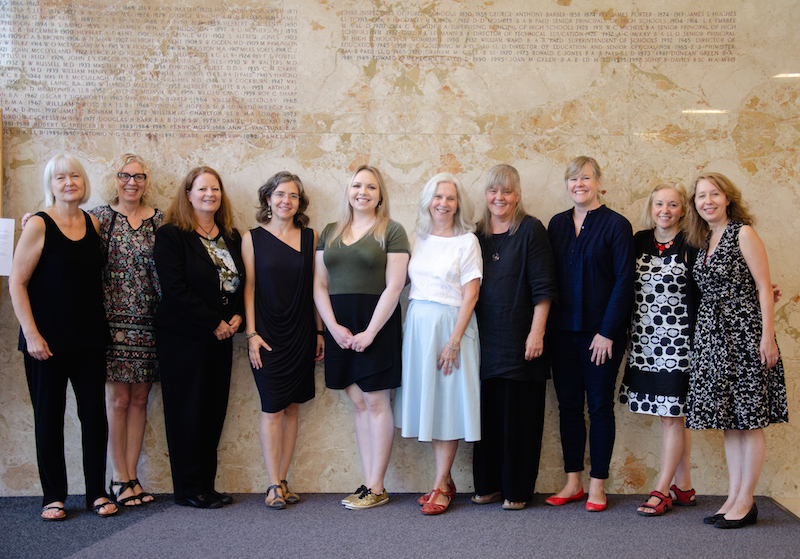
2016 - 2017
The 2016-17 Award was given to Dr. Julia Gray for her excellent qualitative doctoral thesis entitled “An aesthetic of relationality: exploring the intersection of embodiment, imagination and foolishness in research-informed theatre”, which she completed in the Department of Leadership, Higher and Adult Education at OISE. Julia’s thesis committee members were Dr. Pia Kontos (supervisor), Dr. Bonnie Burstow, and Dr. Tara Goldstein.
The Awards Commitee made the following remarks about Julia’s submission: “This is a lyrical, beautifully written and deeply embodied piece of work. Working against an ‘aesthetic of objectivity’ that often dominates the ways in which theatre and research intersect, it is refreshingly different to anything we’ve ever read. Centering an aesthetic of relationality, the thesis is a theorization, a study in and an integrated ethics of reflexivity. Like a double hermeneutic, it makes clear that reflexivity is a foundational concept in critical theoretically-informed work and the raison d’etre of CQ. Encouraging us to be bold, fearless, and radical in our goals for transformation, it offers a new way of thinking about ‘foolishness’, failure, and risk-taking. We are reminded that to be a critical qualitative researcher you must risk playing the fool.”
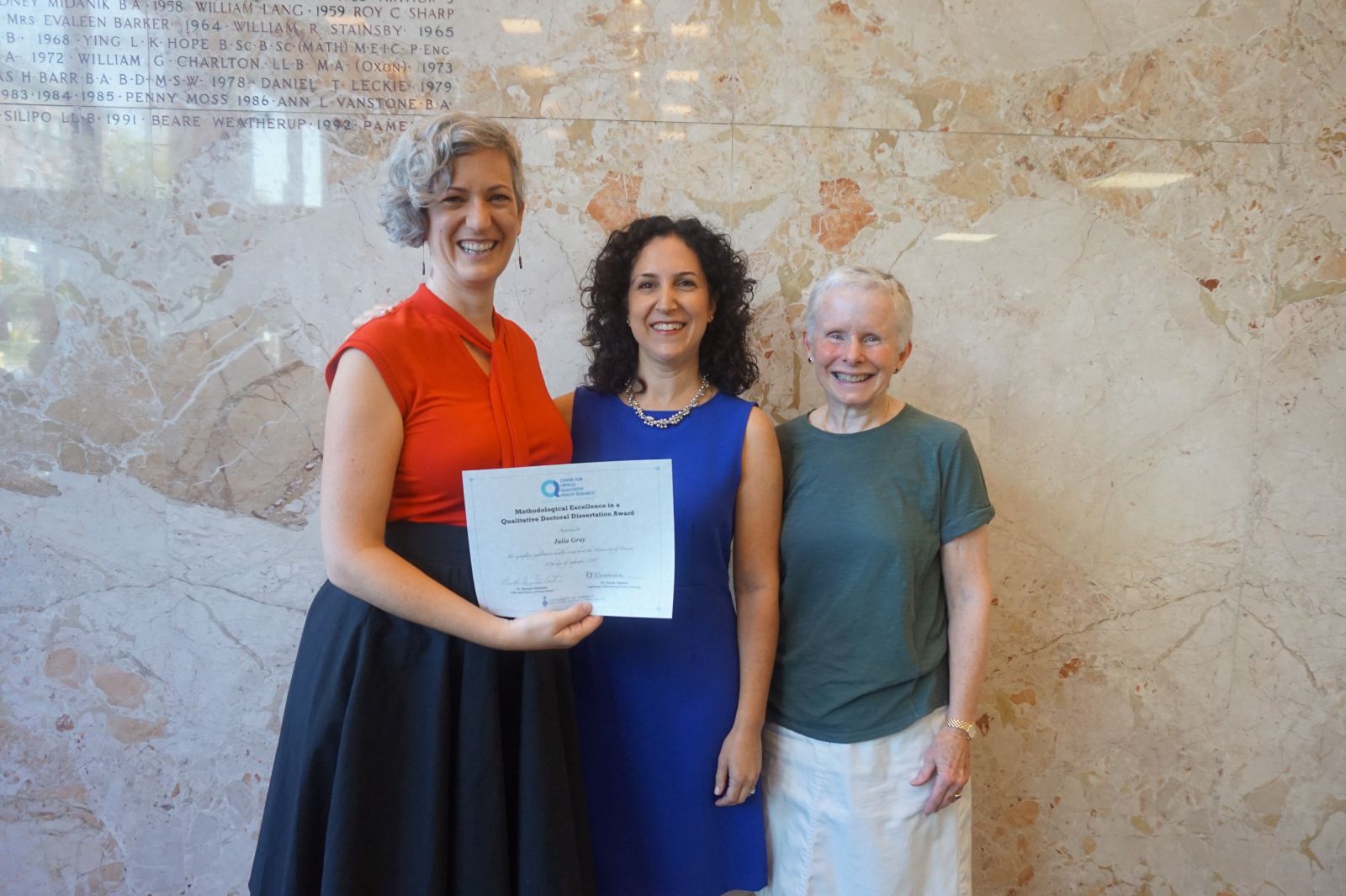
The Honorable Mention went to Dr. Gail Teachman, who graduated from the Rehabilitation Science Institute (RSI), for her thesis “Interrogating inclusion: Critical research with disabled youth who use augmentative and alternative communication.” Gail’s thesis committee members were Dr. Barbara Gibson (co-supervisor), Dr. Colin Macarthur (co-supervisor), and Dr. Peggy McDonough.
The Awards Committee’s comments on Gail’s work included: “This thesis is theoretically sound, cohesive, crisp, and critical. The methodological tools and strategies have impact beyond the substantive findings. We especially appreciate the interrogation of commonly held assumptions about communication and communicators. This provides new methodological strategies for understanding and expanding knowledge of authentic communication.”
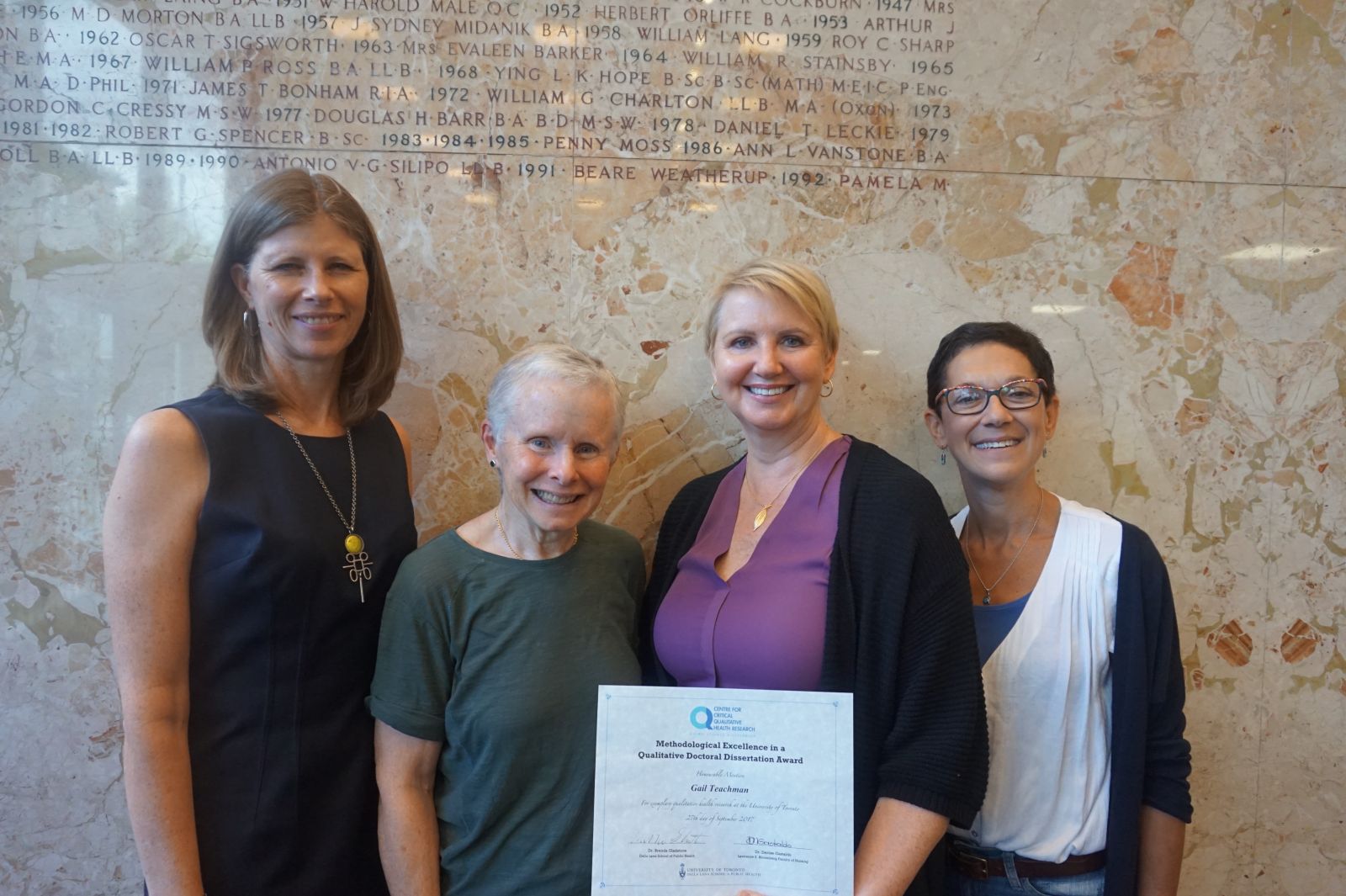
2015- 2016
The 2015-16 Award was given to Dr. Jijian Voronka for her excellent qualitative doctoral thesis entitled “Troubling Inclusion: The politics of peer work and ‘people with lived experience’ in mental health interventions”, which she completed in the Department of Social Justice Education at OISE. Jijian’s thesis committee members were Dr. Sherene Razack (supervisor), Dr. Kimberley White and Dr. Kari Dehli.
The Awards Commitee made the following remarks about Jijian’s submission: “Jijian’s submission is unique in that it seamlessly and skillfully blends autoethnography, critical theory, Foucault, and genealogy with the substantive field of ‘mad studies’, a term which is a resistance and a counter discourse to the dominant mental health/illness discourse. Jijian’s thesis is a creative, reflexive and inherently critical work. This thesis epitomizes critical scholarship; it challenges key notions, concepts, and ideas about the field of ‘mental illness’ and challenges the very notion of it with a new one – ‘madness’. Theory and methodology are integrated throughout this thesis to create a coherent whole. Jijian’s thesis is an exercise in critical reflexivity; she offers a critical take on epistemology and seamlessly situates herself in her work.”
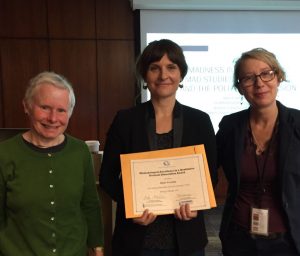
2014 - 2015
The 2014-15 Award was given to Dr. Coralee McLaren for the outstanding work she did for her qualitative doctoral thesis, entitled “Dancing-Bodies-Moving-Spaces: An Ethnography of Disabled and Non-disabled Children’s Movement in a Kindergarten Classroom,” which she completed in the Lawrence S. Bloomberg Faculty of Nursing. Coralee’s thesis committee members were Dr. Pat McKeever (supervisor), Dr. Geoffrey Edwards, Dr. Susan Ruddick, Dr. Tom Chau and Dr. Karl Zabjek.
The Awards Committee made the following comments about Coralee’s submission: “Coralee’s thesis is a brilliant piece of work. Coralee creatively integrated metaphor; her work is lyrical, artfully written and presented. Coralee seamlessly merged health research, social science and the humanities. This dissertation was theoretically and methodologically congruent; it embodies the principles and integrity of CQ.”
The Honorable Mention went to Dr. Maki Iwase, who graduated from the Lawrence S. Bloomberg Faculty of Nursing, for her thesis “The Social Effects of Gestational Diabetes in ‘High-risk ethnic groups’.” Maki’s thesis committee members were Dr. Sioban Nelson (supervisor), Dr. Ping-Chun Hsiung and Dr. Lorna Weir.
The Awards Committee’s comments on Maki’s work included: “A solid dissertation; this work is theoretically and methodologically coherent, well researched, integrative and consistent, and showed great attention to reflexivity, rigour and trustworthiness.”
We invite everyone to read Coralee and Maki’s work, which is available on the University of Toronto’s T-Space at the following link:
Coralee McLaren’s thesis
Maki Iwase’s thesis
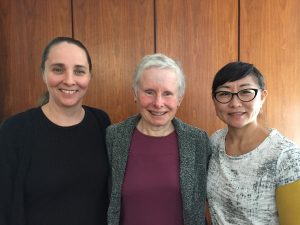
2013 - 2014
The 2013-14 Award was given to Dr. Craig Dale for the exemplary methodological/theoretical work he did for his thesis in the Lawrence S. Bloomberg Faculty of Nursing, entitled “Locating Critical Care Nurses in Mouth Care: An Institutional Ethnography.” Craig’s thesis committee members were Dr. Jan Angus (supervisor), Dr. Eric Mykhalovskiy and Dr. Taz Sinuff.
The Awards Committee made the following comments about Craig’s submission: “This thesis was innovative, taking what is, on the surface, a small aspect of care and problematizing it to show wider implications. The dissertation was methodologically and theoretically strong, cohesive with consistent links between the theoretical lens and methodology (including data collection and analysis strategies), and demonstrated reflexivity and attention to rigour.”
The Honorable Mention went to Dr. Sarah Sanford who graduated from the Dalla Lana School of Public Health for her thesis “Integrating Pandemic through Preparedness: Global Security and the Utility of Threat.” Sarah’s thesis committee members were Dr. Peggy McDonough (supervisor), Dr. Ann Robertson, and Dr. Jessica Polzer.
The Awards Committee’s comments on Sarah’s work included: “Coherent and methodologically very strong – methods flowed logically from the theoretical framing; nice linking between critical discourse analysis and theoretical framework.”
We invite everyone to read Craig and Sarah’s work, which is available on the University of Toronto’s T-Space at the following link:
Craig Dale’s thesis
2011 - 2012
The 2011-12 Award was given to Dr. Ann Fudge Schormans for the superlative methodological/theoretical work she did for her thesis in the University of Toronto’s Factor-Inwentash Faculty of Social Work: “The Right or Responsibility of Inspection: Social Work, Photography, and People with Intellectual Disabilities”.
The Awards Committee made the choice from a very crowded field of excellent submissions, summarizing their rationale for selecting Ann’s research with these notes: “Beautifully written; creative methodology that was very integrated; excellent use of theory that was embedded throughout the thesis; author’s voice was present without taking over; respectful and thoughtful tone regarding participants; an important piece of work; clear to reader how methods could be transferred to other similar contexts; elegantly written with nothing extraneous; readers found it unsettling, empowering, transformative; reviewers learned a lot from the thesis, it made them think differently; they wanted to read the entire thesis; it was a pleasure to read.” Ann will be presenting some of this work at a CQ Speakers Series seminar in early fall.
The Honorable Mention went to Dr. Maria Athina Martimianakis of OISE-UT’s Department of Theory and Policy Studies, for her thesis: “Discourse, Governance and Subjectivity: Interdisciplinarity and Knowledge-Making in Engineering and in Medicine”.
The Award Committee’s notes on Tina’s work included: “very interesting use of methodology; consistent; outstanding; timely/relevant; in keeping with CQ ideals – critical, problematizing what is taken for granted or what has become normal.”
We invite everyone to read these theses, which are available on the University of Toronto’s T-Space at the following links:
Maria Athina Martimianakis’ thesis
We also wish to congratulate the other three top finalists whose theses were described by the reviewers as “sound, clearly met award criteria, instructive, well-written and creative”: Josephine Wong and Esther Ignani (Dalla Lana School of Public Health) and Laurie Clune (Lawrence S. Bloomberg Faculty of Nursing).
2010 - 2011
The innaugural winner was Dr. Brenda Gladstone, graduate of the Social Science and Health doctoral program in the Dalla Lana School of Public Health, for her thesis entitled “All in the Same Boat”: An Analysis of a Support Group for Children of Parents with Mental Illnesses.”
Brenda Gladstone is a health sociologist with a PhD from the Dalla Lana School of Public Health, University of Toronto. For her doctoral work she used ethnographic observations, informal interviews and critical discourse analysis to examine participants’ responses to a psychoeducational support group for children of parents with mental illnesses. In her research capacity at SickKids she uses theoretically informed qualitative and arts-based methodologies in CIHR- and SSHRC- funded studies to investigate help-seeking pathways to mental health care from the perspective of young people experiencing, or ‘at ultra high-risk’ of psychosis. Brenda is Adjunct Lecturer in the Lawrence S. Bloomberg Faculty of Nursing at the University of Toronto where she teaches graduate courses in qualitative methodology at the Centre for Critical Qualitative Health Research.
Honourable mention went to Dr. Pauli Gardner, graduate of the Health and Behavioural Science doctoral program at the Dalla Lana School of Public Health, for her thesis entitled “The Public Life of Older People: Neighbourhoods and Networks.”
We invite everyone to read Brenda and Pauli’s work, which is available on the University of Toronto’s T-Space at the following links:
